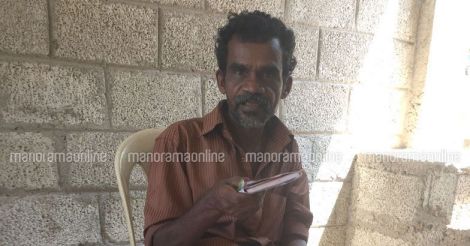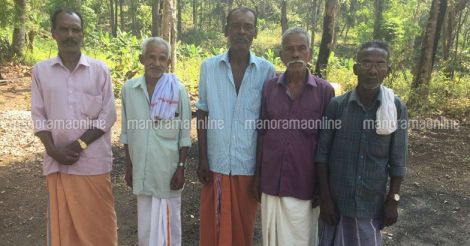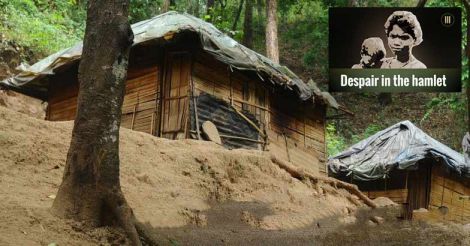(Even as the mob lynching of a starving tribesman in Attappadi roils Kerala, indigenous communities elsewhere are languishing in administrative apathy and social hostility. A look into the lesser known fatalities plaguing tribal hamlets close to the state capital. This is the final part of a series.)
If there is anything more shocking than the alarming rise in suicides in the tribal belt of Peringammala panchayat, it is the apathy of the government. Political leadership and bureaucracy have clearly turned a blind eye towards the social crisis.
Though the 17-year-old Veena’s suicide prompted a minister and other authorities to visit the hamlet and offer their support, the tribal community has seen little difference to their lives. Veena’s family is yet to receive the Rs 3 lakh offered to them as solatium. Veena’s parents have alleged that the young girl’s death was shrouded in mystery but the police have quietly buried the case.
There is no dearth of welfare programs for the tribal population but they never see even a fraction of the money that was supposed to have spent on them. The Kerala government has spent Rs 5,000 crore for the tribal community, with hardly 5 lakh members across the state. Yet they are forever hungry and humiliated.
The authorities would have a hard time justifying the welfare programs when faced with the emaciated body of Attappadi’s Madhu, who was accused of stealing food by a mob before beating him to death last week.
The situation is no different in Peringammala, close to the state capital of Thiruvananthapuram. Outsiders have been exploiting the indigenous communities by hooking them to alcohol and weeds, said Sathyavan Kani. Land grabbers try everything to rob the tribal people of their land, including getting married to the girls, said the Adivasi Congress leader.
 Sathyavan Kani
Sathyavan KaniThe tribesmen no longer have to rely on country liquor these days. The youngsters take refuge in the government-owned liquor shops at Vithura and Palode to drown their worries. Alcoholism is rampant in the tribal hamlets. Could that be a reason for the suicides?
Then Veena was just a 17-year-old college student who did not have anything to do with alcohol.
Deforestation has become rampant. Having lost their habitats, wild animals seek out human settlements and farms in search of food and water. Elephants, boars and sambar deer eat up whatever little the tribesmen manage to grow, said Rajendran Kani, the chief of the Kallana village. Elders from the other village, including Sreedharan Kani from Konnamoodu, Sukumaran Kani from Kattilakkuzhi 1, Vasudevan Kani from Kattilakkuzhi 2 and Balakrishnan Kani from Eeyyakkode, agree.
 Rajendran Kani, Sreedharan Kani, Sukumaran Kani, Vasudevan and Balakrishnan Kani
Rajendran Kani, Sreedharan Kani, Sukumaran Kani, Vasudevan and Balakrishnan KaniFailing facilities
The nearest healthcare facility for the Kani people is the Peringammala public health centre. They also rely on the community health centres at Palode and Vithura. However, they have to travel miles to the Nedumangad government hospital for anything serious. Even pregnant women have to undertake the arduous journey to Nedumangad for a safer delivery.
The state scheduled tribes welfare department has a mobile hospital but that is no longer in working condition, local ward councillor Shanavas Idavom said.
Almost all tribal people possess a ration card that entitles them to free ration under the public distribution system. However, they are not able to claim the ration more than once in a month because the public distribution shops are situated a long way from the hamlets.
Even the nearest shops at Njaraneeli and Idinjar are quite a walk for the families who have no access to any mode of transport.
The tribal children have to rely on a couple of schools with just one teacher. The Government Upper Primary School at Njaraneeli and the government schools at Peringammala are faraway for them.
Employment reservation has not helped the tribal people find jobs though most of them have passed the 10th standard.
Integration that was not
Suicides were a rarity among the tribal population in the days when they were yet to come in close contact with the outsiders. They were content with whatever they could gather or produce.
The tribesmen have left behind many of their ways. And they have incorporated social trends from outside, including rising suicides.
The majority society may be imposing its thinking on the tribal community.” said Prof. Sony Joseph of the Loyola College. “We have to study if these are copycat suicides. These suicides had to have a reason,” said the psychologist.
Another psychologist said that the tribal people were imitating the general public in taking refuge in suicide without giving a thought to its implications. What they need is a social support system. They need emotional support to make them feel that they belong to a community.
Ray of hope
A CBSE school run by the state tribal welfare department is a ray hope in the tribal belt of Peringammala. The residential school was set up at Njaraneeli in 2003 as a pilot project. About 500 students go to the school up to 12th standard. They stay in a hostel near the school.
Selected students belonging to the Scheduled Castes and Scheduled Tribes from across the state study in the Njaraneeli school. The school has 26 staff, including a librarian, and they live in the hostel too.
The school lays emphasis on non-academic activities as well. While nine of the students who passed out of the school last year joined B Tech courses, six others opted for dairy training.
The school had its problems, including the waste generated by the concentration of students. The authorities have launched a wast segregation and treatment system to deal with the problem. They are also working on plans to make the school an eco-friendly establishment by implementing works such as rainwater harvesting.
(Concluded)
Read: Latest Kerala News | Injured Lankan fisherman rescued by Coast Guard brought to Kochi

























 Even as the mob lynching of a starving tribesman in Attappadi roils Kerala, indigenous communities elsewhere are languishing in administrative apathy and social hostility.
Even as the mob lynching of a starving tribesman in Attappadi roils Kerala, indigenous communities elsewhere are languishing in administrative apathy and social hostility.